Regulatory Agencies
Who regulates pipelines in my area?
The Federal Energy Regulatory Commission, or FERC, is an independent agency of the United States government that regulates the interstate transmission of electricity, natural gas, and oil. FERC also reviews proposals to build liquefied natural gas (LNG) terminals and interstate natural gas pipelines.
Among its other powers FERC regulates the transmission and sale of natural gas for resale in interstate commerce; regulates the transportation of oil by pipeline in interstate commerce; and approves the siting and abandonment of interstate natural gas pipelines and storage facilities.
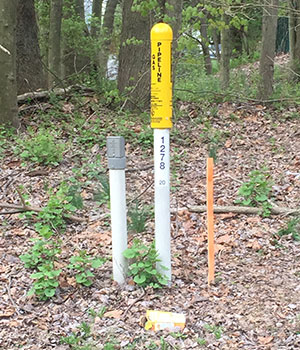 In addition the United States Department of Transportation (USDOT) also oversees the safety of pipelines, which are a form of transportation infrastructure. The Pipeline and Hazardous Material Safety Administration (PHMSA), acting through the Office of Pipeline Safety (OPS), administers the Department's national regulatory program to assure the safe transportation of natural gas, petroleum, and other hazardous materials by pipeline. OPS develops and administers regulations to assure safety in design, construction, testing, operation, maintenance, and emergency response of pipeline facilities.
In addition the United States Department of Transportation (USDOT) also oversees the safety of pipelines, which are a form of transportation infrastructure. The Pipeline and Hazardous Material Safety Administration (PHMSA), acting through the Office of Pipeline Safety (OPS), administers the Department's national regulatory program to assure the safe transportation of natural gas, petroleum, and other hazardous materials by pipeline. OPS develops and administers regulations to assure safety in design, construction, testing, operation, maintenance, and emergency response of pipeline facilities.
At the State level, the Public Utility Commission (PUC) is authorized by the General Assembly to adopt and enforce safety standards for pipeline facilities. The PUC also enforces federal safety standards as an agent for the OPS. These safety standards apply to the design, installation, operation, inspection, testing, construction, extension, replacement, and maintenance of pipeline facilities. The PUC may prescribe additional safety standards over and above federal standards, provided they are not in conflict. Pennsylvania, however, is one of two states that does not regulate the siting of intra-state transmission pipelines.
In addition to PUC oversight, the Pennsylvania Department of Environmental Protection has regulatory authority over any crossing of a wetland or waterway by a pipeline. Pipeline projects located within Delaware River Basin may be subject to regulatory review by the Delaware River Basin Commission (DRBC) when certain threshold established by the Administrative Manual — Rules of Practice and Procedure are met.
Municipal governments (cities, boroughs and townships) are authorized by the General Assembly to enact zoning and subdivision regulations which may regulate the siting and environmental impact of pipeline-related surface facilities. Municipalities also have the regulatory responsibility for minimizing conflicts between pipelines and new development on adjacent lands.
Where can I find information about agencies that regulate pipelines (federal, state, and county)?
There are many agencies that are involved in the process of a pipeline proposal. Below is a list of these agencies with brief descriptions, and what they do. Visit our links page that will connect you with these agencies' websites.
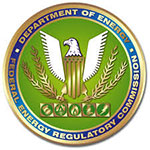 The Federal Energy Regulatory Commission
The Federal Energy Regulatory Commission
According to the Energy Policy Act of 2005, FERC is responsible for:
- the regulation of the transmission and sale of natural gas and oil for resale in interstate commerce;
- the regulation of the transportation of oil by pipeline in interstate commerce;
- Approving the siting and abandonment of interstate natural gas pipelines and storage facilities;
- Approves the siting of liquefied natural gas terminals;
- Ensuring the safe operation and reliability of proposed and operating LNG terminals;
- Monitoring and investigation of energy markets;
- Enforcing FERC regulatory requirements through imposition of civil penalties and other means; and
- overseeing environmental matters related to natural gas and hydroelectricity projects and other matters.
The US Department of Transportation (USDOT) Pipeline and Hazardous Materials Safety Administration(PHMSA)
- Develops and enforces regulations for the "safe, reliable, and environmentally sound operation of the nation's pipeline transportation system."
- Houses the Office of Pipeline Safety (OPS), which is the Federal safety authority for the nation. They provide information regarding pipeline regulation, proposed and final rulemaking, and pipeline statistics.
- PHMSA provides technical resources as well as information relating to their Transmission Integrity Management Program.
- Provides information on the Common Ground Alliance, One Call programs, the National Pipeline Mapping System, and report on accidents/incidents/corrective action orders for major pipelines.
- Provides information on individual state pipeline profiles. Visit the website and select Pennsylvania from the "State Pipeline Profiles" on the left banner.
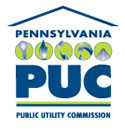 The PA Public Utilities Commission (PUC)
The PA Public Utilities Commission (PUC)
PUC is an agent for PHMSA and:
- The PA PUC enforces the federal pipeline safety regulations in Pennsylvania.
- PA PUC has developed a registry of pipeline operators and is charged with conducting safety inspections of the lines for "all pipeline operators in the state" (as part of PA Act 127, also known as the Pipeline Act, the Gas and Hazardous Liquids Pipelines Act).
- The PA PUC monitors compliance with federal and state regulations by "conducting frequent inspections of pipeline facilities and records of regulated gas utilities."
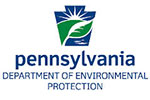 Pennsylvania Department of Environmental Protection(DEP)
Pennsylvania Department of Environmental Protection(DEP)
DEP is responsible for:
- Issuing permits when a pipeline runs through a wetland or crosses a waterway.
- Providing oversight if a project crosses through an area with endangered or rare species.
- Regulating natural gas drilling, as part of its Bureau of Oil and Gas Management, in areas of the state were natural gas is extracted.
- PADEP is tasked with facilitating and defining a series of best practices and recommendations to the Governor by February 2016. Learn more about the Pipeline Infrastructure Task Force.
- PA DEP has presented their Final Report to Governor Wolf. You can read the top 12 recommendations or read the full Pipeline Infrastructure Task Force Final Report.
- The PaDEP Pennsylvania Pipeline Portal web site provides information to the public on:
- The Commonwealth's pipeline permitting process and the roles that citizens, companies, non-profit organizations and government officials can play in the process;
- Links to agency and commission sources of information, to provide access to as much of the public record as possible; and
- Information on the large-scale pipelines that propose to cross multiple counties and regions and have permits under DEP review.
 The Delaware River Basin Commission (DRBC)
The Delaware River Basin Commission (DRBC)
DRBC is
- a multi-state and federal river basin compact agency that, among other things, regulates water-related projects, including certain transmission pipelines, within the Basin. DRBC approvals (in most instances called "dockets") are adopted at DRBC's quarterly public meetings.
- responsible for regulating water withdrawals and discharges related to hydrostatic testing, alterations of wetlands and large ground water infiltration areas, and crossings of existing and proposed reservoirs and recreation project areas that have been included in the Commission's Comprehensive Plan; may require special use permits where pipelines are proposed to be located in floodways.
- represented on PADEP's Pipeline Infrastructure Task Force, which was convened to develop policies, guidelines and tools to assist in pipeline development (including planning, permitting and construction) as well as long-term operation and maintenance. Task Force recommendations are to be submitted to the Governor by February 2016.
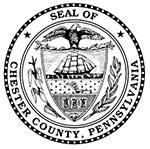 Chester County
Chester County
Chester County has no regulatory authority over pipeline operators, but may be engaged in the environmental review of proposals and coordinating emergency services response in the event of an incident. Some of the involved County offices include:
- Planning Commission,
- Water Resources Authority,
- Conservation District,
- Facilities and Parks, and
- Department of Emergency Services.
The level of involvement of these groups varies depending on what is being proposed and how the County is notified. While most of the county agencies only serve in an advisory role in the pipeline planning and notification process, they also play an integral role in communication with the larger community.




